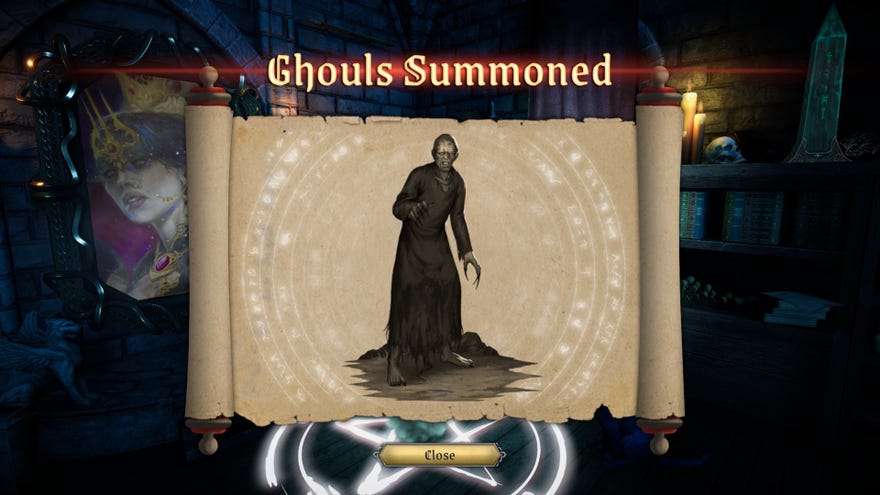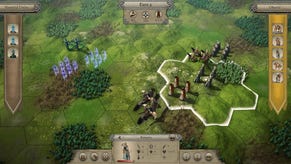Rally Point: Master of Magic, and a dash of Total Warhammer, on balance
Some free-for-alls are more freer for all than others
From the heady mists of 1994 once came Master Of Magic, an all-time best 4X loosely summarisable as Civilisation crossed with Master Of Orion.
In the... uh, semi-heady fog of 2019 came the news that it was getting a remake, and I was muchly excited, for in the interim I'd actually learned the original existed and how good and somehow unrivalled it still was. And finally, in the slight damp of late 2022, that remake arrived. It is a remarkably faithful remake, to a degree I may not ever have seen for such an old game. Some details and flourishes aside, it's basically the same design, with all the same parts.
Coincidentally, I've also finally got into Total Warhammer lately, and spent some time reacquainting myself with Warlords Battlecry, and in between building city walls and crushing stupid aryan elfs, I've realised what truly connects all three: balance. They all, correctly, reject it.
Twammer is a slight odd one out here, since it's a mega-huge corporate release with a corresponding giant playerbase, some of which delights in multiplayer. That's the traditional death of balance in games, especially strategy games, as just about any online game is doomed to be colonised by the people who play online games. Total Warhammer 3 specifically launched a beta of its Immortal Empires campaign last year, which is basically the standard 4X template of "everyone starts with a province and tries to conquer the world" on a ludicrous scale. The full roster of playable factions is enormous and the neutrals are not inert. A game starts with 273 sides taking a turn (impressively quickly for what it's worth, unlike the appalling battle loading times).
While Immortal Empires feels like the concept everyone wanted in the first place, its full playabe roster comes with an eye-watering pricetag that I'm not going to start an argument about beyond saying "fucking hell". For the record, I tried Total Warhammer 2 and gave up within an hour or two due to its microscopic fonts, unreadable blue-on-blue map where even the exposed parts are covered in fog for some goddamn reason, and intensely irritating camera. But after beating 3 up with mods, I'll leave it at "I have complaints", because its great strength is those innumerable factions, and the variety of playstyles their armies and abilities foment.
Newbies include the ogres, who I've loved since my Blood Bowl days (and still await recognition for "Cogito Ogre Sum"), and are much what you'd expect: big lads who bowl through everyone, even their own tiny disposable-yet-indispensible goblin lackeys. They fight for money and meat, hiring out to other factions and recruiting on the move where most factions have to run back to town, always fighting, always hungry. They're a bit one note, but it's a good note. Contrast them to Slaanesh, unique among the demonic factions for their focus on diplomacy. They get a special system of seduction, whereby repeated contact with most humanoid factions can eventually tip over to their total submission as (frustratingly buggy) vassal states. They get a power to proliferate cults thousands of miles away, and a lightning fast army focused on flanking and weakening the enemy's will to resist. They're hard to use, but thematically perfect - those who fight you expose themselves to your influence, resisting what's ahead while whispering temptation catches them from the rear. You present a charming face while watching cults slowly seep you into the world.
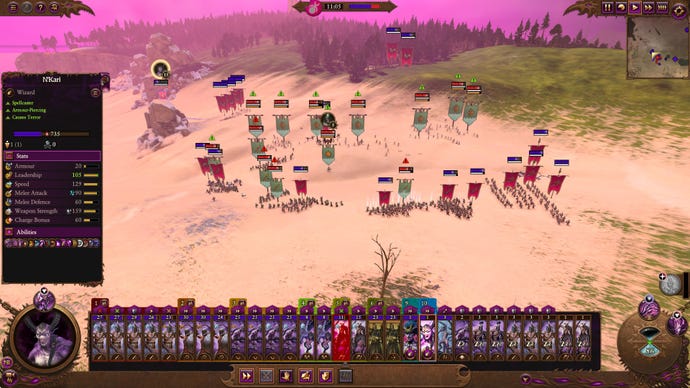
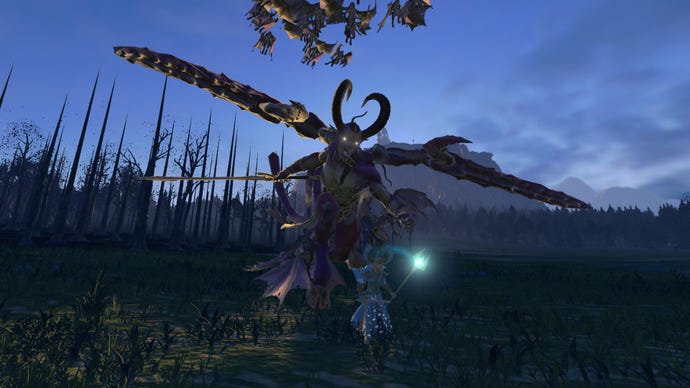
Cathay, meanwhile, is the bulwark between mortal civilisations and the tide of Chaos, and fights to maintain political stability while yelling at the rest of the world for its stupid petty squabbles in the face of a real threat. And from TW2, there's a faction of vampire pirates. Vampire pirates who raid and plunder and leave enough intact to siphon off their share while they move on to reave somewhere new. One of their leaders isn't even undead, and in fact despises them, but leads an army of them anyway to fight fire with fire. All with different resources, goals, and means of exerting and gathering power. It's all so evocative.
Most importantly, they're unequal. Some factions are plain stronger than others, be it an advantageous position, overpowered magic, indomitable troops, or just a lack of exploitable weaknesses. Total War has ever had this - it's not like Rome was on equal footing with Pontus - but the move into intentionally ludicrous, campy kitchen sink fantasy lets the Warhammer ones really indulge. You don't just have slightly different spearmen; this guy's soldiers are literally giants, and where your faction don't even have any archers, your neighbour has cannons. I'd love to see a version where they really lean into the disparate power levels, to the extent that Blood Bowl did with its stunty teams, but can't really expect it of something with such a budget and large-scale audience expectations.
That's where Master Of Magic comes in, and reminds me that I namedropped MoM while covering Warlords Battlecry 3 for a reason.
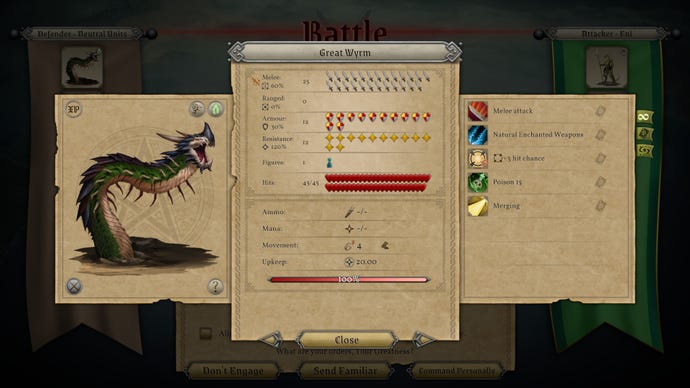
So. You design a wizard, then pick a race of mortals to lead to world domination on a randomised Civilisation-ish 4X map (actually two that exist in parallel). But you're literally working from different books to your rivals; a wizard gets 10-12 points to spend on spellbooks from 5 schools, or some perks instead. Focusing on one school gives you access to its stronger spells, while multibooking sacrifices raw power for broader options. Perks let you start on that alternative, less crowded map, cast more efficiently, or get a headstart on creating magical items. It's even possible to set up as a wizard who eschews magic almost entirely, banking on raw military and economic power to crush all these spelling nerds with your army of snarling dog people.
Each magical school has its weaknesses, some schools mix poorly, and your choice of race can change everything. Orcs are the standard, able to build or train anything, but everyone else makes sacrifices. Halflings are weaker in melee but produce more food, allowing bigger armies with the "lucky" trait to boost accuracy. Barbarians get strong berserkers and throwing weapons, but they can't build advanced structures or units. But it's not just asymmetry. Lizardmen are outright worse than most races, sacrificing almost all building for javelins and big fire-breathing turtles that, while cool, are soon outclassed or plain outnumbered by strong economies. But all their units can move and fight in water, giving them a theme with some niche uses. Races from the second plane, Myrror, are more extreme: all draconians can fly, while trolls constantly regenerate even from death.
Every other wizard is reduced to just some dickhead who hates you more every day
Each magical school or perk brings different potential to each race. Death magic is good for summoning strong monsters and boosting them with spells, which are redundant with the powerful soldiers but weak economy and magic generation of gnolls. Then there are the klackons, who everyone hates, and who hate everyone, inspiring mutual genocide. Pick them, lizards, or gnolls, and expect to lose. It is the same, warts and all.
The most notable change is that the maps are bigger, but everything also has more move points, so instead of one hex (as opposed to the original's squares) basic units can move two. This offers a bit more flexibility, particularly previously vulnerable skirmishers. But it also exacerbates the usual 4X problem of tediously shuffling icons around just to get your armies anywhere. There are build queues now, but no rally points, and the pacing is slow. Diplomacy is still anaemic, which makes narrative sense (there can only be one). But it limits roleplaying fun, and reduces every other wizard to just some dickhead who hates you more every day, and bleats at you for being in their territory without telling you where it is.
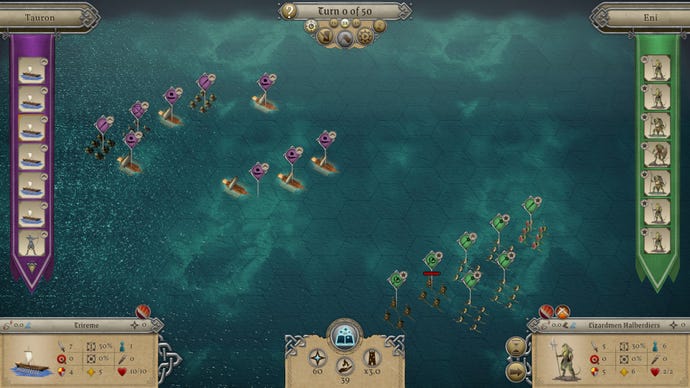
The biggest hurdle, though, may be that it's lost that pixelly charm. The new worlds are 3D, with much better animations and some excellent unit art, but the lurid cartoonish colours felt distinctive in a way the new look isn't. By appearances, it's very... "this is a 4X", you know? Units have that slight delay in moving that got annoying even in a stunning game like Endless Legend, because however nice your animation, seeing it 200 times is less appealing than even primitive but instantaneous sliding tiles. Wizards themselves are supposedly trapped in a mirror, and depicted as a mere drawing on a weird floating scroll. Summoned creatures like the still-overpowered shadow demons are drawn similarly, but worst of all, even banishing a rival just pops up a text notification. It's a huge anticlimax. The mirror thing feels like a real miscalculation. There's no drama to it, is the thing, and that's at odds with the rest.
Both Masters Of Magic are about choosing your own combination of powers with little regard for what's fair and equal, and seeing what you can make of them. It's a tradition that eschews balance for imagination, letting you pick Sorcery Halflings and Death Lizards, just to try it. Maybe you'll be Nature/Chaos/Alchemy Klackons who conquer everyone regardless of the unrest, and sponsor superpowered heroes with piles of magic items. You'll probably lose. Try it anyway.
That's ultimately why I still love the new Master Of Magic, even if it loses some charm, and could have chance a few more little changes. The biggest advantage, and defining aspect of a game whose balance is properly imbalanced isn't even a wooly philosophical one. It's that when you finish a game, win or lose, you get an idea for what to try next. It's enough to make up for complaints like Twarhammer's clunky UI and infurating camera, for Battlecry's outmoded sprites and chaotic difficulty, and for the flaws that Slitherine's MoM remake has perhaps unwisely ported. I want to see more of it, and I think general audiences are more ready for it than we often assume.
